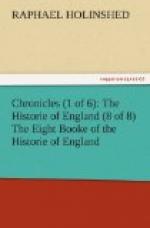When Albion chiefe capteine of the giants was slaine, the residue that remained at home in the Ile, continued without any rule or restraint of law, in so much that they fell to such a dissolute order of life, that they seemed little or nothing to differ from brute beasts: and those are they which our ancient chronicles call the giants, who were so named, as well for the huge proportion of their stature (sithens as before is said, that age brought foorth far greater men than are now liuing) as also for that they were the first, or at the least the furthest in remembrance of any that had inhabited this countrie. For this word Gigines, or Gegines, from whence our word giant (as some take it) is deriued, is a Greeke word, and signifieth, Borne or bred of or in the earth, for our fore-elders, specially the Gentiles, being ignorant of the true beginning of mankind, were persuaded, that the first inhabitants of any countrie were bred out of the earth, and therefore when they could go no higher, [Sidenote: Terrae filius what it signifieth.] reckoning the descents of their predecessours, they would name him Terrae filius, The sonne of the earth: and so the giants whom the poets faine to haue sought to make battell against heauen, are called the sonnes of the earth: and the first inhabitants generally of euery countrie were of the Greekes called Gigines, or Gegines, and of the Latines [Sidenote: Aborigines. Indigenae.] Aborigines, and Indigenae, that is, People borne of the earth from the beginning, and comming from no other countrie, but bred within the same.
These giants and first inhabitants of this Ile continued in their beastlie kind of life vnto the arriuall of the ladies, which some of our chronicles ignorantly write to be the daughters of Dioclesian the king of Assyria, whereas in deed they haue beene deceiued, in taking the [Sidenote: The mistaking of the name of Dioclesianus for Danaus.] word Danaus to be short written for Dioclesianus: and by the same meanes haue diuers words and names beene mistaken, both in our chronicles, and in diuers other ancient written woorks. But this is a fault that learned men should not so much trouble themselues about, considering the [Sidenote: Hugh the Italian. Harding. Iohn Rous_ out of Dauid Pencair.] same hath bin alreadie found by sundrie authors ling sithens, as Hugh the Italian, Iohn Harding, Iohn Rouse of Warwike, and others, speciallie by the helpe of Dauid Pencair a British historie, who recite the historie vnder the name of Danaus and his daughters. And because we would not any man to thinke, that the historie of these daughters of Danaus is onelie of purpose deuised, and brought in place of Dioclesianus, to excuse the imperfection of our writers, whereas there was either no such historie (or at the least no such women that [Sidenote: Nennius.] arriued in this Ile) the authoritie of Nennius a Briton writer may be auouched, who wrote aboue 900. yeares past, and maketh mention of the arriuall of such ladies.




